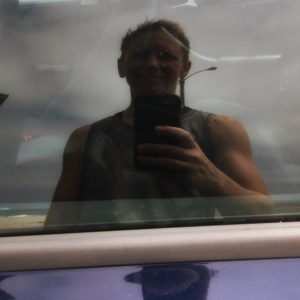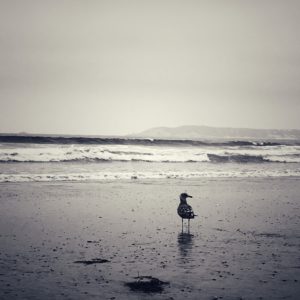I wanted to wish you a happy Pride… which I realize I’m a little late with.
Pride Weekend came and went July 14 and 15th here in San Diego. From what I hear, San Diego Pride is one of the biggest, coolest, most awesomest Pride celebrations in the country.
But, uh, I can’t verify that because I didn’t go.
I thought about going. I talked about going. I even asked the gf if she wanted to run the Pride 5k race on Saturday with me… but then I realized I had to work and she realized she had a thing for one of her kids and what was I thinking? It wasn’t going to work out.
I thought maybe I’d go on Sunday, but I went to the beach by myself instead, ran six miles while I listened to Joseph Campbell’s A Hero with a Thousand Faces. Running my six miles on the beach as part of my Spartan Beast training seemed much more important than wandering the booths of gay-friendly merchants and picking up swag.
The Right to Be Boring
Overall, I think I’m a pretty boring lesbian.
As I wrote in my Instagram post on the topic, besides listening to an obscure book on comparative mythology while I ran by myself on the beach, my homosexual agenda for Pride Weekend also included restocking on Greek yogurt and spending much too long trying to get Genghis Khan out of his financial crisis in Civilization V (that’s a computer game, for the uninitiated).
But this quiet, boring life I enjoy… it’s also exactly what Pride achieved.


(Above: Unsolicited Instagram photos from my beach run on Sunday)
The ease with which I wear my hair short and my men’s jeans without fearing harassment; the ease with which I mention “my girlfriend” in casual conversation at work; the great privilege of choosing whether or not I want to participate in a Pride celebration that the city publicly endorses — all of these are gifts that previous generations of gay activists bestowed upon me, and which I’m afraid I take too much for granted most of the time.
At the end of the day, the Stonewall rioters who unintentionally started the Pride tradition just wanted the right to dance and flirt and be flaming and live their lives while being left alone. Forty years later, I hope they look around the Western world and nod their heads with a satisfied feeling of accomplishment.
There are still plenty of places in the world — including the Western world — where it’s still a very dicey thing to be openly queer. But many of us now enjoy the right to openly be our average, boring selves without fear of reprisal.
The Future of the Queer Community…
Wait, WHAT Queer “Community”?
I worry a little that, in our very enjoyment of our boring lives, people like me are unintentionally undermining the long tradition of queer solidarity and community.
I read a statistic not long ago that made my eyes pop — a full 20 percent of millennials identify as LGBTQ+. They’ve grown up in an era where gay marriage is legal, where it’s okay to ask and tell in the military, where most places consider violence against queers a hate crime. Queerness is close enough to normalized that they feel free to explore their gender-bending feelings. Their friend groups include straight people and gay people and everything in between. Certainly not for all of them, but for many of them, declaring oneself as queer is as matter-of-fact as changing their hair color.
But embedded within such privilege is also the privilege of forgetting queer history. The privilege of taking tolerance for granted. The privilege of not “needing” other queers in their lives. Why would they, when their straight friends are open-minded, accepting, and supportive?
I remember when Queer As Folk came out in the early 2000s. A group of us used to gather at a friend’s house to watch every episode — maybe half a dozen gay men, plus me, my girlfriend at the time, and one other lesbian. We gathered together each week because it was exciting — and unusual — to see openly queer people at the center of a television show. We gathered because watching it was our weekly bonding time. We gathered because we were a group of tight-knit queer friends.
Back then, we still knew we needed each other. George W. Bush had just been elected president, and fighting for the right to be boring was a fight that felt far from over.
But these days, almost every TV show has at least one queer character. It’s nothing special anymore. And anyway, Queer is Folk is on Netflix. You don’t have to wait for it to come on once per week, and you can watch from the comfort of your own living room.
I know quite a few queer people today who scoff at the idea of needing queer friends or queer community. They don’t like the *drama* that seems inherent within the gay community, they say. They complain that Pride is too commercialized (it is) and they don’t see the point of fighting for parking under a sweltering summer sun just to gather HRC stickers from smiling vendors who are “inclusive” whenever there’s money on the table.
The Privilege of Boring is the Responsibility to Keep Fighting
The gay activists of the previous generation gave us the right to get married, to bicker like any other boring married couple, to get divorced and fight over our assets. It’s an ironic forward progress, this right to be as boring as anyone else.
But if the existence of a “President” Donald Trump has taught us anything, it should be that tolerance is not irreversible and we still need each other.
“Fighting” for our right to be mainstream and boring doesn’t necessarily mean showing up to a protest — or to Pride — and holding a sign. It might, but it can mean a lot of other things, too.
“Fighting” for the queer community can mean simply being *OUT*. More than anything, it’s been “I have a gay aunt / trans brother / bi daughter / roommate / friend / neighbor / co-worker” that has turned the tide on the public perception of queer people.
“Fighting” can include voting. It can include donating.
For me, “fighting” includes those things, plus writing books geared for a mostly queer audience. To tell stories that resonate with our own lives and experiences and what we go through.
I hope they give you a sense of belonging and community, no matter where you are in this big world of ours. I hope they make up for not fighting for parking at Pride. 😉
Photo used totally without permission from Times of San Diego.



4 Comments
Bugs · July 18, 2018 at 4:38 pm
Provokes the mind, really. And necessary. Cheers, mate.
Things CAN change in a blink of an eye if we continue to take our freedom for granted. LGBTQ+ rights are very new. Look at women’s rights and civil rights in America. They’re now being shaved off, bit by bit. The public is still ignorant and silent about it. As outsiders, we can see the changing tides under this authoritarian-wannabe US government that is being fed increasingly absolute power. What do the people of America, think will happen to LGBTQ+ rights, after they’ve stripped women and minorities of their basic human rights?
Your title is spot on, mate. Important issue that bears pondering….
The Real Person!
I wouldn’t quite go so far as to say that the public in the U.S. is ignorant and silent about women’s / civil rights being attacked. Without a doubt, there’s more protesting and activism going on here than I think I’ve ever seen in my lifetime. About a third of the country supports Trump with a sort of cultish, brain-washed absolute loyalty; the other 70 percent of us range from disappointed to utterly outraged. I’m in the “utterly outraged” camp, and so are a lot of others.
Bugs · July 18, 2018 at 7:48 pm
I do hope you’re right, mate!
Anne Hagan · July 18, 2018 at 10:55 pm
A thought provoking post, Eliza. I have to agree. My wife and I live in the tiny rural village she grew up in. We’re not the first lesbian or gay couple to buy property here and call it home but we’re the first out and open ones. We’ve skipped the pride celebrations in the big city an hour away the last couple of years. We’re happy and settled and what’s the point, right? Right…
I’m angered by the news every single day. I retweet, I post, I support causes and donate money. I wish I could donate time but, living where I do, there’s not a lot of opportunities to do that for the resistance and women’s rights movements. I hope we see a sea change in November. Given all of that though, I don’t think we’ll ever be able to convince those growing up queer now to study history. They’ll support the causes they want to support but the past is the past in their eyes.
Everything changes. Everything. Nothing stays the same. Nothing stays the way the majority wishes it would and trys to keep it. We have to roll with the times.